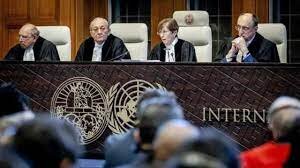The International Court of Justice order: An achievement for Gaza people

On December 29, 2023, the South African government filed a lawsuit against Israel based on Article 9 of the Convention on the Prevention and Punishment of Genocide.
At the International Court of Justice (ICJ), the Republic of South Africa alleged that Israel is responsible for violations of the Genocide Convention in respect of its actions taken in Gaza, allegations which Israel rejects.
South Africa asked the Court to order nine such measures, including the cessation of military operations, and the Court has now responded to that request. In its order of 26 January 2024, the Court pointed to the attack of 7 October 2023 on Israel that included hostage-taking and loss of life, as well as human suffering, loss of life, displacement of civilians and damage to the infrastructure in Gaza at the hands of Israel.
The present case is brought under the 1948 Genocide Convention, a treaty to which South Africa and Israel, like most of the world, are parties and under its provisions have agreed to send any disputes about the Convention to the Court. Israel argues there is not a “dispute” and that therefore the Court does not have jurisdiction.
The Court has not taken a decision on whether or not genocide has been committed. Nor has the Court decided whether it even has jurisdiction to hear the case. Yet, for the purpose of the provisional measures order, the ICJ only had to decide whether it had prima facie jurisdiction.
The interim ruling issued by the Court ordered six provisional measures, including for Israel to take all measures to prevent genocidal acts, prevent and punish the direct and public incitement to genocide, and take immediate and effective steps to ensure the provision of humanitarian assistance to civilians in Gaza.
The provisional measures are legally binding on Israel and there is no right of appeal. There is of course no international police to enforce rulings of the ICJ. But any decisions the Court takes have at least political and diplomatic impacts, including in the court of public opinion. It would also be possible to take the issue to the UN Security Council.
The legal definition of genocide is a narrow one. It comprises ‘any of the following acts committed with intent to destroy, in whole or in part, a national, ethnic, racial or religious group. Thus, genocide is notoriously difficult to prove, because of the need to show or infer a genocidal intent. While the deaths of so many civilians in Gaza have given rise to allegations that Israel is violating international humanitarian law, it is not possible to bring such allegations before the ICJ since there is no treaty equivalent to the Genocide Convention which confers jurisdiction on the Court. War crimes will be for criminal courts to investigate.
The Court considered the Palestinians a protected party subject to the Genocide Convention. Despite being difficult to prove the genocidal intent, these provisional measures should be considered an achievement in favor of the Palestinian people. This is the first time that a lawsuit has been filed against the Israeli regime for genocide. The regime that until now claimed to be the victim of Genocide (Holocaust), itself should be held accountable in the position of the accused.
Furthermore, this interim order will be a good support for other courts such as the International Criminal Court and domestic courts. However, it seems that the international community, collectively and individually, can use this order to exert diplomatic and financial pressure against Israel and force the regime to enforce these provisional measures. Since it is open to other states party to the Genocide Convention to intervene to join the case in support of one side, by this order other states can join the case in support of the Palestinian side.
Although the court's interim order can be considered as an achievement for the people of Gaza, the court's order does not include an immediate ceasefire or insisting that Israel cease all military activity in the strip.
***********Mahbubeh Pakdel has a master's degree in international law from the University of Tehran
Culled from Tehran Times

